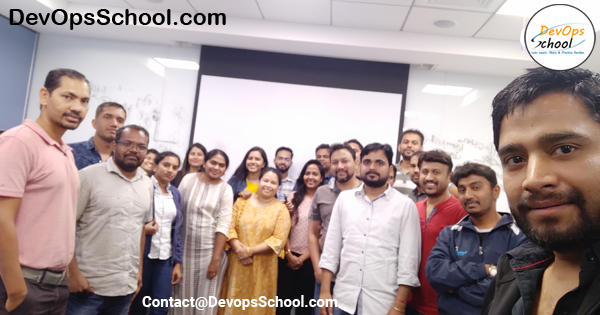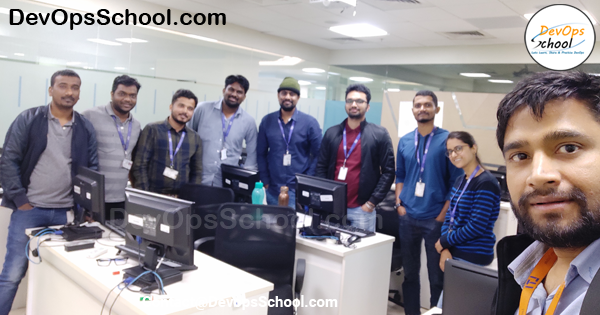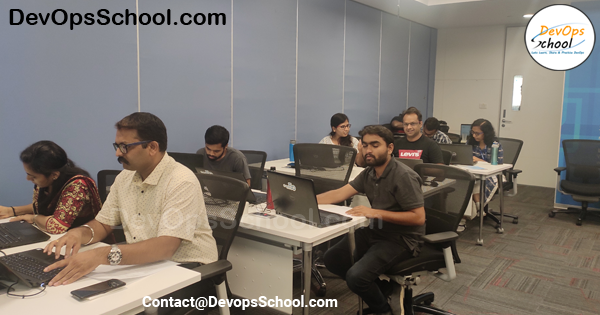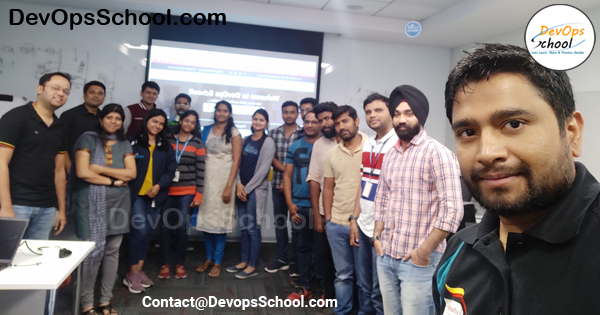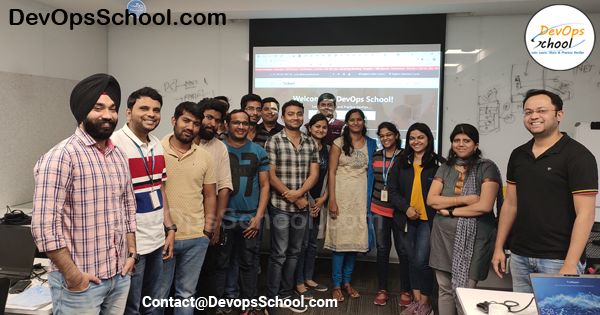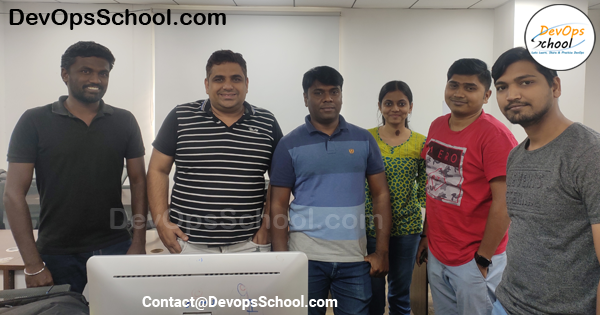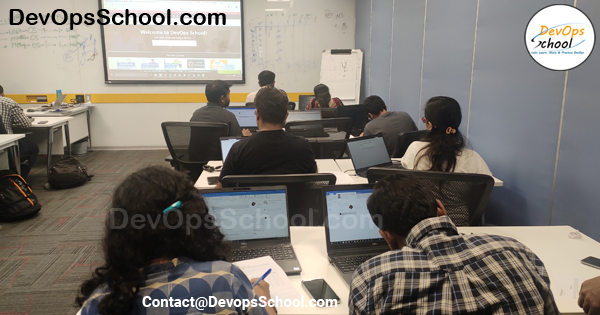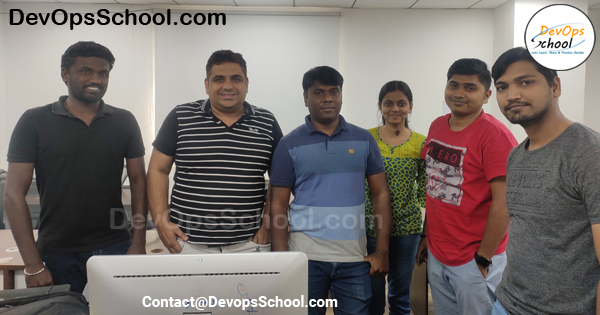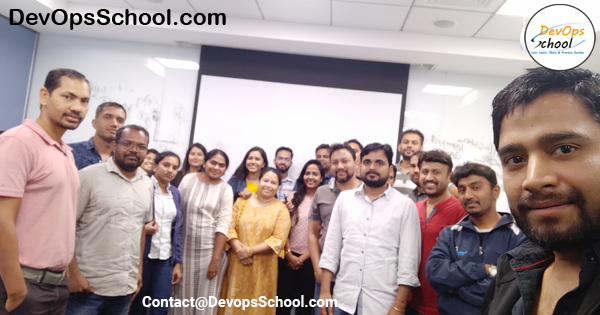About this Course and Certification
This Kubernetes Course and Certification program by aiuniverse, in collaboration with DevOpsSchool.com, is designed to provide an end-to-end learning experience, from the fundamentals to advanced concepts of Kubernetes. The course focuses on enabling participants to deploy, manage, and scale containerized applications using Kubernetes in cloud-native environments.
Kubernetes is rapidly becoming the de facto standard for container orchestration and managing distributed systems, making it an essential skill for anyone pursuing a career in DevOps, IT infrastructure, and software engineering. This program not only offers practical, hands-on experience but also prepares you for the Certified Kubernetes Administrator (CKA) certification. Led by Rajesh Kumar, a renowned expert with over 15 years of experience in the DevOps ecosystem, this course promises a comprehensive learning experience.
What is Kubernetes?
Kubernetes, often abbreviated as K8s, is an open-source platform that automates the management, scaling, and deployment of containerized applications. It orchestrates compute, network, and storage infrastructure on behalf of user workloads.
In this course, the following key Kubernetes tools will be used:
- Kubectl: Command-line tool for interacting with Kubernetes clusters.
- Helm: Kubernetes package manager to automate the deployment of complex applications.
- Prometheus & Grafana: Tools for monitoring and alerting in Kubernetes environments.
- Kustomize: For Kubernetes configuration management.
- Container Runtimes: Such as Docker or containerd, integrated with Kubernetes for running application containers.
You will learn how these tools work together to deliver highly scalable and reliable applications.
Why is Kubernetes Important?
As organizations increasingly adopt microservices architecture, Kubernetes has emerged as a powerful tool to manage large-scale, containerized applications. Here’s why learning Kubernetes is crucial:
- Scalability: Kubernetes helps manage applications at any scale, whether you’re handling hundreds of users or millions.
- Self-Healing: It automatically restarts failed containers, replaces them, and reschedules them without manual intervention.
- Portability: Kubernetes can run on-premise, in the cloud, or in hybrid environments, making it highly adaptable.
- Community Support: Backed by an active community and supported by major cloud providers, Kubernetes is continuously evolving.
- Job Market Demand: There is a significant demand for Kubernetes experts across industries, making it a lucrative career path.
Mastering Kubernetes gives you a competitive edge in the DevOps and cloud-native job market.
Course Features
- Instructor-Led Training: Delivered by Rajesh Kumar, a Kubernetes and DevOps veteran with practical insights.
- Hands-on Labs: Extensive labs designed to give real-world experience in deploying and managing Kubernetes clusters.
- Comprehensive Curriculum: Covering Kubernetes basics to advanced topics like scaling, security, and monitoring.
- Interactive Learning Environment: Group discussions, quizzes, and collaborative projects for better engagement.
- Certification Preparation: Focused preparation for the Certified Kubernetes Administrator (CKA) exam with mock tests and practice sessions.
- Lifetime Access to Resources: You will gain lifetime access to course materials, recorded sessions, and resources.
Training Objectives
The course is designed with the following learning objectives:
- Gain an in-depth understanding of Kubernetes architecture, including Pods, Nodes, and Services.
- Learn to deploy, scale, and manage applications in Kubernetes.
- Implement security and monitoring best practices in Kubernetes environments.
- Understand the networking and storage components of Kubernetes clusters.
- Automate Kubernetes deployments using Helm, Kustomize, and other tools.
- Prepare for and pass the Certified Kubernetes Administrator (CKA) exam.
By the end of the course, you will be able to confidently manage Kubernetes clusters in production environments.
Target Audience
This course is suited for:
- DevOps Engineers: Looking to specialize in container orchestration and cloud-native applications.
- System Administrators: Transitioning from traditional environments to containerized solutions.
- Software Engineers: Aiming to develop scalable and resilient microservices architectures.
- Cloud Administrators: Wanting to optimize cloud infrastructure using Kubernetes.
- IT Professionals: Eager to learn Kubernetes and enhance their DevOps skill set.
Whether you’re an experienced professional or a beginner, this course will equip you with the skills to excel in Kubernetes.
Training Methodology
This course uses a blended approach to learning, including:
- Live Instructor-Led Sessions: Expert-led classes with real-time interactions.
- Hands-On Labs: Interactive lab sessions for applying theoretical concepts to real-world use cases.
- Group Discussions and Q&A: Collaborative discussions to solve complex problems and clarify doubts.
- Quizzes and Assignments: Periodic assessments to track progress and reinforce learning.
- Mock Exams: CKA-focused mock exams to prepare for the certification exam.
Training Materials
The following materials are provided as part of the course:
- Presentation Slides: Covering each topic with detailed explanations.
- Lab Guides: Step-by-step instructions for hands-on exercises.
- Video Recordings: Access to recorded sessions for self-paced review.
- Kubernetes Command Cheat Sheets: Handy reference guides for common kubectl commands.
- Supplementary Documentation: Access to Kubernetes official docs, along with custom resources created by the instructor.
Evaluation
The effectiveness of the training program will be evaluated through:
- Pre-Test: To assess participants’ existing knowledge of Kubernetes.
- Post-Test: To measure the improvement in knowledge after the course.
- Lab Assignments: Hands-on projects to demonstrate your ability to manage Kubernetes environments.
- Mock CKA Exam: To simulate the CKA certification exam and gauge readiness.
Feedback will also be collected via surveys to ensure the course meets the learning objectives of participants.
Continuing Education
Post-training, participants can continue their learning journey with:
- Advanced Kubernetes Courses: Explore modules on Kubernetes security, networking, and advanced operations.
- Online Community: Engage with fellow learners and industry experts through forums and webinars.
- Professional Webinars: Regular webinars to stay updated with the latest in Kubernetes and cloud-native technologies.
Certification Program
This course is meticulously aligned with the Certified Kubernetes Administrator (CKA) exam. Upon course completion, participants will:
- Be fully prepared to take the CKA exam.
- Have the foundational skills needed to pursue other Kubernetes certifications such as Certified Kubernetes Application Developer (CKAD).
These certifications are globally recognized and will significantly enhance your career prospects in DevOps and cloud-native environments.
Level of Training: Fundamental to Advanced
The course is structured to cater to all levels of learners:
- Beginner Level: Introduction to Kubernetes concepts and basic cluster management.
- Intermediate Level: Focus on Kubernetes operations, scaling, and networking.
- Advanced Level: Deep dive into security, monitoring, troubleshooting, and disaster recovery.
Each module builds upon the last, ensuring a progressive learning experience.
Agenda (Day-Wise Breakdown)
Day 1: Introduction to Kubernetes
- Kubernetes Fundamentals
- Understanding Kubernetes Architecture
- Introduction to Pods, Services, and Deployments
Day 2: Kubernetes Cluster Management
- Node Management
- Persistent Storage and Volumes
- Scaling Applications
Day 3: Advanced Kubernetes Concepts
- Kubernetes Networking: Ingress, Load Balancers
- ConfigMaps and Secrets
- Stateful Applications in Kubernetes
Day 4: Security and Monitoring
- Kubernetes Security: RBAC, Network Policies
- Setting up Prometheus and Grafana for Monitoring
- Logging and Debugging in Kubernetes
Day 5: Certification Preparation and Review
- Mock CKA Exam
- Review of Key Concepts and Best Practices
- Q&A and Final Lab Exercises
Lab Setup
Participants will require the following for the lab exercises:
- Cloud Access: AWS, Google Cloud, or Azure accounts for deploying Kubernetes clusters.
- Local Environment: Machines with Docker, Minikube, and Kubectl installed.
- Kubernetes Tools: Helm, Prometheus, and other Kubernetes-specific tools.
- Text Editor: Recommended to use Visual Studio Code or similar for YAML configuration files.
Trainers
Rajesh Kumar, a well-known name in the DevOps community, will lead the course. With more than 15 years of experience in the industry, Rajesh specializes in cloud-native technologies and has helped countless professionals achieve mastery in Kubernetes, Docker, and other DevOps tools. His expertise and teaching methodology ensure a comprehensive understanding of Kubernetes, making learning engaging and practical.
FAQ
- What is Kubernetes and why should I learn it? Kubernetes is the leading platform for automating the deployment, scaling, and management of containerized applications. It’s an essential skill for professionals in DevOps, IT, and cloud roles.
- Who is this course for? The course is ideal for DevOps engineers, system administrators, cloud architects, and anyone looking to enhance their Kubernetes skills.
- What certifications does this course prepare me for? This course prepares you for the Certified Kubernetes Administrator (CKA) certification. It also provides a strong foundation for other Kubernetes-related certifications.
- Do I need prior experience with containers? Basic knowledge of Docker and Linux is recommended, but the course starts from the fundamentals, making it accessible to beginners.
- How is the course delivered? The course is instructor-led with live online sessions, hands-on labs, quizzes, and mock exams.
- How long is the course? The course spans over 5 days, with each day focusing on key topics and hands-on labs.
- Will I have access to course materials after the training? Yes, participants will have lifetime access to recorded sessions, presentations, and lab guides.
- Is this course hands-on? Absolutely. The course includes extensive hands-on labs and real-world use cases to ensure practical learning.
- How will the training be evaluated? The training will include pre-tests, post-tests, and a mock CKA exam to evaluate your progress.
- What support do I get after the course? Participants will have access to an online community and resources for continuous learning, as well as ongoing support for certification preparation.
Certification
- Certification always plays vital role as it leads you towards a dedicated knowledge and skillsets.
- It provides you the ability to stand out of others.
- It gives you an edge during an interview by impressing the interviewer through your certification.
- DevOpsSchool helps you getting this certificate by making you worth to have it.
- DevOpsSchool gives you a completion certificate after successfully completion your training. it will be as a proof of your ability of knowledge and skills.
- The training will be given by industry recognized expert trainers who will make you an expert professional to hold this certificate.
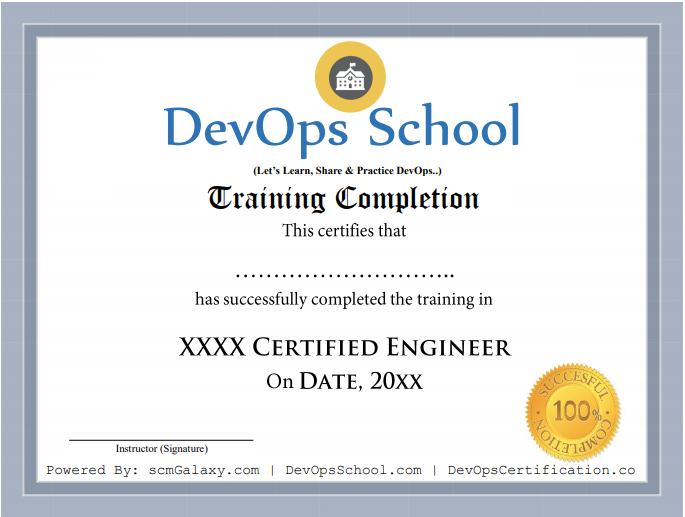
Reviews
By having an excellent journey with 8000+ participants from different countries we have got excellent reviews that helps us stand out of other institutes and being proud. We proudly can say we have helped so many individuals and working professionals to build their career. Here are some of the reviews that we have got from our participants who are happy by being a part of DevOpsSchool.
Videos
Projects
During this training you will get a real-time based project to work on, which will help you to implement your learnings and also it will boost your knowledge and skills. With important tools and platforms you will have real-world experience where we help you to visualize a real development environment, testing environment and production environments.
FAQs
1. Will I get technical support after completion of training?
- Yes, Its free of cost for life time. We will give you can access of our Google drive where you can drop you query and our trainers will respond you back.
2. Why should I learn DataOps course online instead of offline?
- First this is the best option to keep you and your instructor safe in this dangerous pendamic. As well as the environment and benefits what you will get in offline classes same we will provide you in online classes. We will make your experience much better and comfortable than offline classes. That’s why we provide live and instructor-led online classes where you can interact your instructor to clear your doubts.
3. How long will it take to complete the course?
- It will take approx 3 Hrs to fully complete the course.
4. Will I get any placements after the training?
- Well we don’t provide any placements as of now but we can provide you a interview kit to help you out.
5. What are the pre-requisies to learn DataOps?
- Basic knowledge of SQL/YAML
- Familiarity with Linux
6. Can a non technical person learn DataOps?
- Yes, but it will be very hard to learn because here the technical words and platforms will be used that he will be not aware of so in my recommendation you shouldn’t try but if still if you want to then yoou should be very concentrated and honest with you as you have to work hard.
7. Do you have online classes or offline classes?
- As of now online classes but he it is a group of people requirement then we can have discussion about offline classes.
8. Will I get the job after completing this course?
- Yes, you will be fully capable to perform any task given to you by your domain senior or manager. As you will be certified engineer who will have all the required skills and knowledge to perform any task.
9. Which kind of certification will DevOpsSchool provide?
- It’s a completion certificate. It will show that you have successfully completed the training and have the right skills and knowledge to perform the task assigned by your company.
10. How to start a DataOps career?
- You can go for self learning materials like Pdf, Slides, Youtube videos but there are one more option that is our DataOps program. It’s our DataOps certified program that will teach you from basic to make you able to understand and perform a DataOps engineer tasks.
11. Who will be my trainer?
- As we have so many trainers its not possible to tell you quickly, as we have to go through their availability. But we can assure you you will get a best trainer as we have a group of best trainers who are very experienced and skillful trainers. They have 15+ iT working experience.
12. Can I get a demo session?
No we don’t provide any demo class but instead of that we can provide you a class recordings so you can decide.
All the Demo/Hands-on are to be executed by our trainers on DevOpsSchool’s AWS cloud. We will provide you the step-wise guide to set up the LAB which will be used for doing the hands-on exercises, assignments, etc. Participants can practice by setting up the instances in AWS FREE tier account or they can use Virtual Machines (VMs) for practicals.
13. Do we have classroom training?
Yes, Classroom training is available in Bangalore, Hyderabad, Chennai and Delhi location. Apart from these cities classroom session can be possible if the number of participants are 6 plus in that specific city.
14. How will I execute the Practicals?
All the Demo/Hands-on are to be executed by our trainers on DevOpsSchool’s AWS cloud. We will provide you the step-wise guide to set up the LAB which will be used for doing the hands-on exercises, assignments, etc. Participants can practice by setting up the instances in AWS FREE tier account or they can use Virtual Machines (VMs) for practicals.
15. What if I miss any class?
In case if you miss the class then there are two ways to get to know what topics has been covered, i.e 1st- We will share the class recordings, notes etc to you and 2nd – you can attend any other session under 3 months of time period.
Our Gallery
